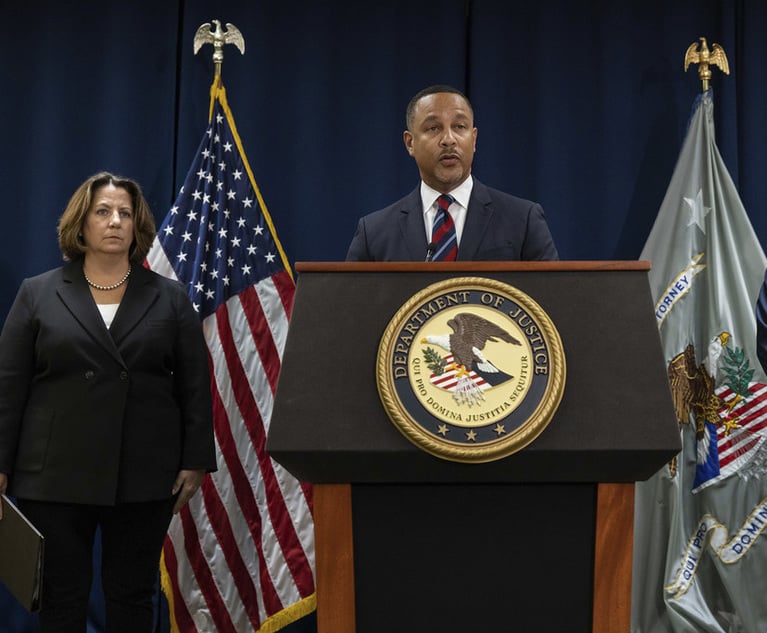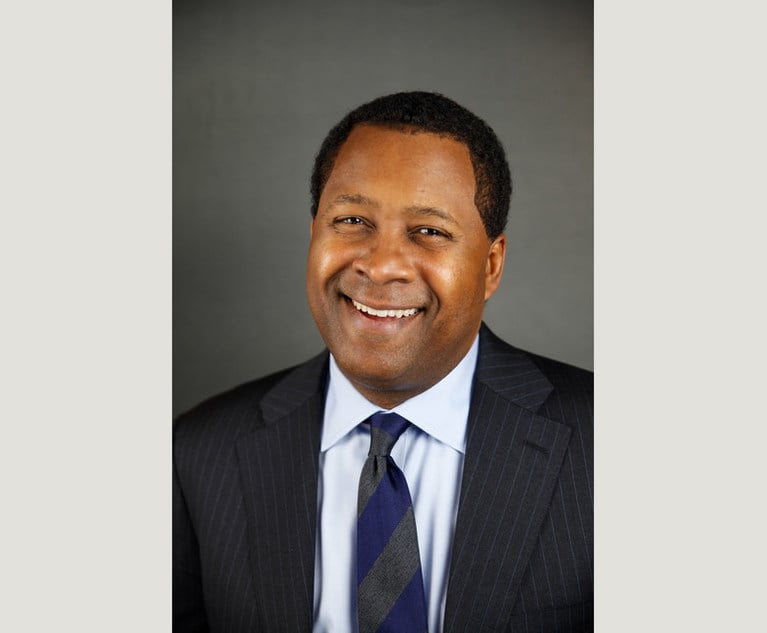Compliance Hot Spots: 'Brilliant' Move Amid Corruption Probe | Goldman Sachs & Khuzami | Plus: Who Got the SEC Work
Gibson Dunn's F. Joseph Warin walks us through his counseling on the Petrobas foreign-bribery deal, and we've got a roundup of the latest compliance and enforcement headlines. Plus, see who got the work on latest SEC cases. Thanks for reading Compliance Hot Spots.
October 03, 2018 at 07:00 AM
8 minute read
Welcome to Compliance Hot Spots, our briefing on compliance, enforcement and government affairs. On the heels of Petrobas' $853 million settlement resolving bribery allegations, we catch up with Gibson Dunn's Joe Warin, who guided the Brazilian state oil company to a resolution with U.S. enforcers. Plus: A team from Murphy & McGonigle offers tips on avoiding an enforcement action from the Commodity Futures Trading Commission (spoiler: beef up internal whistleblower programs). Scroll down for the latest on who's getting work on the SEC enforcement front.
Thanks for reading—and please do send feedback. I appreciate hearing from you about what's on your plate—observations, trends, new clients. I'm at [email protected] and 202-828-0315, or follow me on Twitter @cryanbarber.
Why the Petrobas Deal Didn't Come With a Compliance Monitor
A non-prosecution agreement. A discount off the fine for cooperation in the investigation. A fine that appeared to reflect the recent U.S. policy of not piling duplicative penalties on corporate offenders.
For Petrobas, there was a lot to like about the recent $853 million settlement resolving a long-running bribery investigation into the Brazilian state oil company. But among the most favorable elements of the settlement was what didn't appear in the terms: a compliance monitor.
Petrobas escaped a large corruption scandal without the government demanding that an outside compliance monitor look over the company's shoulder for the next few years. For that, Petrobas has a former compliance monitor partially to thank.
 Joe Warin
Joe WarinGibson, Dunn & Crutcher partner F. Joseph Warin, who represented Petrobas through the investigation, said the company succeeded in showing that it was changing its ways and taking compliance seriously as it moved past Operation Car Wash, a corruption probe that ensnared top executives and politicians in Latin America's largest economy. Reflecting on how Petrobas engaged with U.S. authorities, Warin said the company benefited from the creation of an independent special committee—and from the passage of time.
“A path toward remediation was being charted early on. I think that oftentimes companies are in fits and starts about how to handle a matter,” Warin tells me. “I think the company here, Petrobas, was prescient to empower the special committee to have as much gravitas within the organization, both with the board and with the company.”
Warin adds: “If you look back on four years that we had been handling the matter, the special committee was frankly a brilliant move. It acted as a foundational element and set up the argument to say there's no need for extra supervision. There is a whole vibrant compliance structure.”
No company relishes a long-running investigation. But in the complicated case of Petrobas, the length of the investigation helped show that the company had not merely instituted a paper program but rather made meaningful compliance reforms, Warin says.
More from my interview with Warin: “Because it went on for four years, you had a much better opportunity to see if compliance activities are working or not. In some ways—no prosecutor ever said this to me—but Petrobras was so vigorous in the vetting of its contractors, I'm confident the DOJ and SEC heard about that. It's very hard to get back in the saddle at Petrobras as a contractor. That proved the compliance program was not just for show but rather it was vigorous and people were cut out of doing business unless they could demonstrate they were a highly compliant company and any of their misconduct had been eradicated by terminations.”
One advantage of long investigations, Warin says, is that a company has more interactions with enforcers. The disadvantage, of course, is that the investigation lasts for years. “After four years, you're able to take the measure of an organization by how they react to matters and how they approach matters.”
➤➤ Some of the most helpful interactions, Warin says, were in-person meetings between Petrobas executives and enforcers in the United States. With foreign clients, Warin says, “I think it's even more important to humanize it to the U.S. enforcers.” The meetings gave U.S. enforcers “a measure of the man,” he says.
“The executives were available to answer and take on any subject, and frankly hard subjects. That's something we repeatedly do on matters we handle,” Warin tells me. “I'm a repeat player. So it's important for them to get behind Joe Warin at Gibson Dunn and get to the core of the leadership.”
Compliance & Enforcement Reading: Goldman Sachs Warned Firms About Khuzami
Robert Khuzami, the deputy U.S. attorney in SDNY supervising the Michael Cohen case, was a hard-charger at the Obama-era Securities and Enforcement Exchange. So much so, according to new Bloomberg reporting, that Goldman Sachs warned its outside firms they might lose business if they hired him when he was leaving the agency.
“He's schooled in the view that the job is to do justice,” former Khuzami colleague George Canellos, now at Milbank, Tweed, Hadley & McCloy, told Bloomberg. Khuzami landed at Kirkland & Ellis, where he reported on a U.S. ethics office financial disclosure—we had the scoop here—$11 million in partner share.
Some other headlines that caught my eye…
>> Want to avoid CFTC enforcement actions? Here's how. Murphy & McGoniglepartners Elizabeth Davis, Joseph Facciponti and Brian Walsh write at the NLJ: “Given the CFTC's intense focus on whistleblower complaints and the increased incentives in award amounts and frequency, now is a good time for businesses to get ahead of any potential enforcement actions by maintaining robust internal whistleblower programs.”
>> Lessons from Elon Musk – Tesla settlement with the SEC: “[Jay] Clayton is focused on holding individuals liable and not just corporate entities,” Mary Hansen, co-chair of the white-collar team at Drinker Biddle & Reath, told Reuters. My colleague Caroline Spiezio has more here at Corporate Counsel.
>> An increasing number of public companies in the past several years have voluntarily opted to disclose corporate donations above and beyond what is required by law, but doing so often exposes the businesses to backlash from shareholders. Corporate Counsel's Kristen Rasmussen has more here.
>> “A group of financial technology companies is banding together to lobby lawmakers and regulators on cryptocurrencies—and they plan to pay their Washington advocates partly in digital coins,” according to a Bloomberg report.
> “Sanctions violations accounted for 56% of all fines handed out by regulators around the world in the past 10 years, a new study shows,” the Wall Street Journal reports. Read the Fenergo report here.
Who Got the Work
>> Walgreens turned to Sidley Austin's Neal Sullivan to resolve claims that the company misled investors about projected earnings in connection with the company's 2012 merger with Alliance Boots. The Securities and Exchange Commission alleged that Walgreens executives stood by projections that the combined company would bring in more than $9 billion in fiscal year 2016, even after internal forecasts suggested a higher risk of missing that mark. In 2014, Walgreens stock fell 14.3 percent the day the company announced a revised projection of $7.2 billion in net operating income for fiscal year 2016. Walgreens paid a $34.5 million penalty, with two former executives—represented by Paul Hastings partner Mark Pollack and Caz Hashemi at Wilson Sonsini Goodrich & Rosati—each paying a $160,000 fine.
>> Cahill Gordon & Reindel's Brad Bondi, the brother of Florida Attorney General Pam Bondi, helped Salix Pharmaceuticals Ltd. put to rest allegations that it understated the amount of its drugs that wholesaler customers held in inventory, misleading investors and analysts about the company's future sales. Salix was credited for self-reporting the misconduct to the SEC and launching an internal investigation that led the company's former chief financial officer, Adam Derbyshire, to resign. Derbyshire, represented by BuckleySandler partner Thomas Sporkin, paid more than $1 million to resolve charges related to his role.
>> Renaud Laplanche, the founder and former CEO of Lending Club, hired Milbank, Tweed, Hadley & McCloy partner Scott Edelman amid allegations concerning fraudulently inflated company returns. The settlement, in which Laplanche agreed to pay a $200,000 fine and a suspension of at least three years from the securities industry, came two years after the Lending Club board forced him to resign. Lending Club, represented by Quinn Emanuel Urquhart & Sullivan partner John Potter, agreed to pay a $4 million penalty.
Thanks for reading! Feedback and tips are always appreciated. I'm at [email protected] and 202-828-0315, or follow me on Twitter @cryanbarber.
This content has been archived. It is available through our partners, LexisNexis® and Bloomberg Law.
To view this content, please continue to their sites.
Not a Lexis Subscriber?
Subscribe Now
Not a Bloomberg Law Subscriber?
Subscribe Now
NOT FOR REPRINT
© 2025 ALM Global, LLC, All Rights Reserved. Request academic re-use from www.copyright.com. All other uses, submit a request to [email protected]. For more information visit Asset & Logo Licensing.
You Might Like
View All
Compliance Hot Spots: GOP Eyes ESG as an Antitrust Issue + Another DOJ Crypto Seizure + Sidley Partner Jumps to Main Justice
9 minute read
Compliance Hot Spots: Lessons from Lafarge + Fraud Section Chief Talks Compliance + Cravath Lands FTC Commissioner
11 minute readTrending Stories
- 1Parties’ Reservation of Rights Defeats Attempt to Enforce Settlement in Principle
- 2ACC CLO Survey Waves Warning Flags for Boards
- 3States Accuse Trump of Thwarting Court's Funding Restoration Order
- 4Microsoft Becomes Latest Tech Company to Face Claims of Stealing Marketing Commissions From Influencers
- 5Coral Gables Attorney Busted for Stalking Lawyer
Who Got The Work
J. Brugh Lower of Gibbons has entered an appearance for industrial equipment supplier Devco Corporation in a pending trademark infringement lawsuit. The suit, accusing the defendant of selling knock-off Graco products, was filed Dec. 18 in New Jersey District Court by Rivkin Radler on behalf of Graco Inc. and Graco Minnesota. The case, assigned to U.S. District Judge Zahid N. Quraishi, is 3:24-cv-11294, Graco Inc. et al v. Devco Corporation.
Who Got The Work
Rebecca Maller-Stein and Kent A. Yalowitz of Arnold & Porter Kaye Scholer have entered their appearances for Hanaco Venture Capital and its executives, Lior Prosor and David Frankel, in a pending securities lawsuit. The action, filed on Dec. 24 in New York Southern District Court by Zell, Aron & Co. on behalf of Goldeneye Advisors, accuses the defendants of negligently and fraudulently managing the plaintiff's $1 million investment. The case, assigned to U.S. District Judge Vernon S. Broderick, is 1:24-cv-09918, Goldeneye Advisors, LLC v. Hanaco Venture Capital, Ltd. et al.
Who Got The Work
Attorneys from A&O Shearman has stepped in as defense counsel for Toronto-Dominion Bank and other defendants in a pending securities class action. The suit, filed Dec. 11 in New York Southern District Court by Bleichmar Fonti & Auld, accuses the defendants of concealing the bank's 'pervasive' deficiencies in regards to its compliance with the Bank Secrecy Act and the quality of its anti-money laundering controls. The case, assigned to U.S. District Judge Arun Subramanian, is 1:24-cv-09445, Gonzalez v. The Toronto-Dominion Bank et al.
Who Got The Work
Crown Castle International, a Pennsylvania company providing shared communications infrastructure, has turned to Luke D. Wolf of Gordon Rees Scully Mansukhani to fend off a pending breach-of-contract lawsuit. The court action, filed Nov. 25 in Michigan Eastern District Court by Hooper Hathaway PC on behalf of The Town Residences LLC, accuses Crown Castle of failing to transfer approximately $30,000 in utility payments from T-Mobile in breach of a roof-top lease and assignment agreement. The case, assigned to U.S. District Judge Susan K. Declercq, is 2:24-cv-13131, The Town Residences LLC v. T-Mobile US, Inc. et al.
Who Got The Work
Wilfred P. Coronato and Daniel M. Schwartz of McCarter & English have stepped in as defense counsel to Electrolux Home Products Inc. in a pending product liability lawsuit. The court action, filed Nov. 26 in New York Eastern District Court by Poulos Lopiccolo PC and Nagel Rice LLP on behalf of David Stern, alleges that the defendant's refrigerators’ drawers and shelving repeatedly break and fall apart within months after purchase. The case, assigned to U.S. District Judge Joan M. Azrack, is 2:24-cv-08204, Stern v. Electrolux Home Products, Inc.
Featured Firms
Law Offices of Gary Martin Hays & Associates, P.C.
(470) 294-1674
Law Offices of Mark E. Salomone
(857) 444-6468
Smith & Hassler
(713) 739-1250













